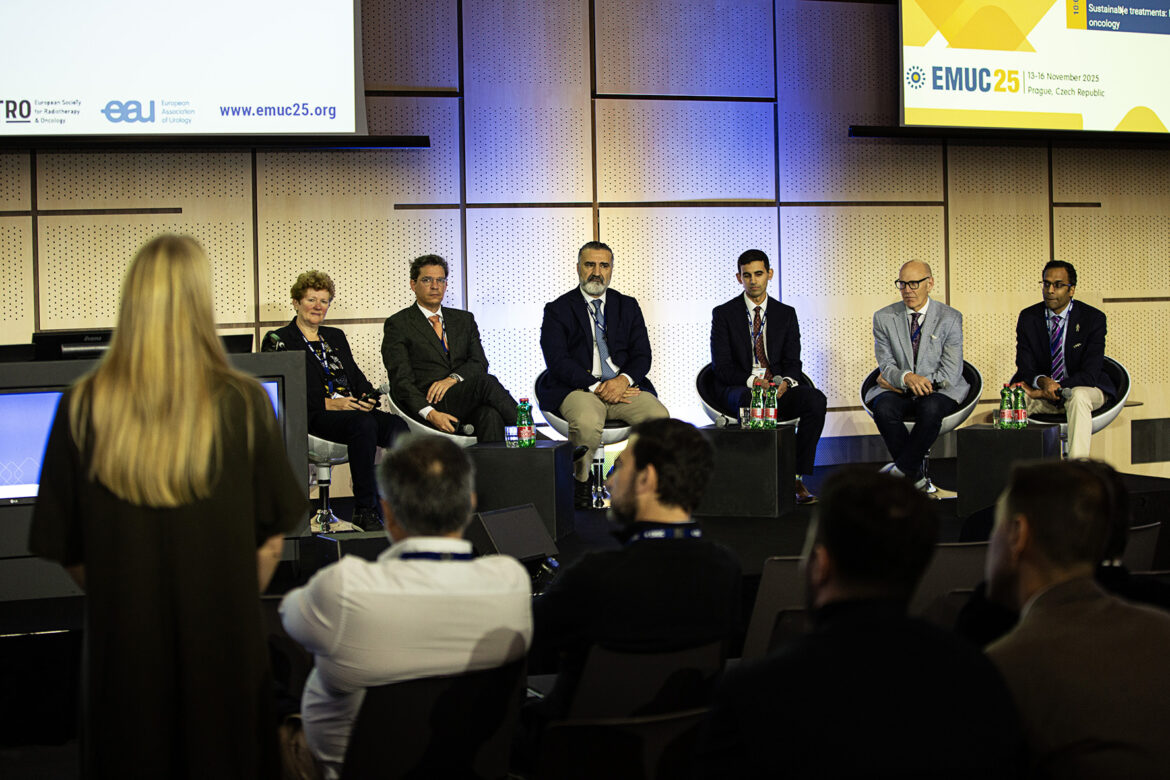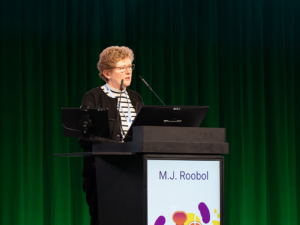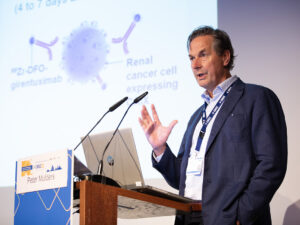“Healthcare is the fifth largest producer of greenhouse gases in the world” was a recurring claim in Plenary Session 1: Innovating for a sustainable future in genito-urinary cancer care: The road to 2050”. The session featured sustainability in diagnosis and staging, as well as in treatments for radiation therapy, surgery, and medical oncology.
Sustainable diagnosis and staging
In his presentation “Sustainable diagnosis and staging,” Prof. Veeru Kasivisvanathan (GB) outlined key sustainability principles, including “use less” (reduce waste and minimise unnecessary consumption), “use longer” (extend the lifespan of existing products), and “use greener” (adopt more environmentally friendly alternatives).
In urothelial diagnostics, sustainability in patient selection includes optimising secondary-care referrals. From a diagnostic perspective, key measures include establishing one-stop haematuria clinics, decarbonising flexible cystoscopy (for example, avoiding sterile cystoscope drapes by placing the scope on the decontamination storage tray and omitting hospital gowns), performing flexis in the clinical setting, minimising the use of CT urograms, and implementing same-day preoperative assessment.
Regarding sustainability in prostate cancer (PCa) diagnostics, Prof. Kasivisvanathan emphasised selecting patients at the highest risk of harbouring clinically significant PCa for imaging or biopsy. He added to avoid the diagnosis of clinically significant cancer; reduce the risk of complications to patients; and to use imaging and biopsy appropriately to ensure high-quality outcomes. He also noted that optimising imaging departments—such as by switching off unused electronic devices and PACS systems—can yield substantial environmental benefits, with the latter alone capable of saving an estimated 51.2 tonnes of CO₂ annually.
On radiation therapy (RT)
Radiation oncologist Dr. David Hunt (GB) discussed hypofractionation as a sustainable alternative to standard RT during his presentation “Sustainable treatments: Radiation therapy”. Hypofractionation is when the total dose of radiation is divided into large doses, and treatments are given less often.
Dr. Hunt addressed the audience and said, “To the leaders in the room, we need you to champion high-impact change in terms of how we run, build, and deliver, and empower healthcare services. We need your voices to be loud to drive improvements within the industry where we’re making big decisions in the procurement of equipment and [to encourage] the development of more sustainable, durable, and efficient devices.”
To fellow radiation oncologists, he stated, “You can make the biggest difference today. Adopt the evidence-based hypofractionated radiotherapy, such as in the PACE B protocol. Participate in and await trial data from other hypofractionation trials. Read and/or implement guidelines.”
Dr. Hunt urged the rest of the audience to make every treatment count. “I hope you’ll take something away from today’s Plenary Session. May it inspire you to think about what you can do not just for the workplace. No one’s going to make healthcare sustainable for us. It has to come from within.”
On surgery
“25% of hospital waste comes from the OR,” stated Dr. Benjamin Pradère (FR), who shared the “climate-smart actions”: sustainability, reduce waste, recycle, reuse, and reduce energy consumption in his presentation “Sustainable treatments: Surgery”.
According to Dr. Pradère, education for segregation is key. Most of the waste can be considered as regular/uncontaminated waste. He underscored the importance of proposing dedicated recycling facilities for segregation. He added that preoperative waste comes from the devices used, and that there is an urgent need for recycling programmes and other manufacturing/packaging modifications.
Dr. Pradère provided examples of more sustainable practices in surgical care. He noted that spinal anaesthesia produces 67 times less greenhouse gas (GHG) emissions compared to general anaesthesia. He discussed the advantages and disadvantages of reusable products (i.e., regarding endoscopic instruments). He encouraged combating planned obsolescence by powering down consoles and streamlining data management. Separating waste generated before the operating room from intraoperative waste was associated with a 50% reduction in annual waste output. He also promoted performing TURBT procedures in ambulatory settings. He added to favour oral postoperative treatments.
According to Dr. Pradère, energy consumption is the largest source of GHG emissions in the surgical environment; thus, reducing the use of heating, ventilation, and air-conditioning systems and powering operating rooms with clean energy were recommended strategies.
On medical oncology
Some of what medical oncologist Prof. Yüksel Ürün (TR) discussed in his presentation “Sustainable Treatments: Medical oncology” were the exploration of the clinical, economic, environmental, and social dimensions of sustainable genitourinary (GU) cancer care. Clinically, he emphasised the importance of smarter trials, leveraging real-world data, treatment de-escalation, and shorter therapy durations. From an economic perspective, he highlighted value-based care and outcome-linked pricing. On the environmental front, he discussed initiatives such as green hospitals, renewable energy, reducing drug waste, and sustainable supply chains. Socially, he underscored the need for diversity in clinical trials and empowering patients as co-creators in their care.
Medical oncologist Dr. Elena Castro (ES), nuclear medicine physician Prof. Dr. Karolien Goffin (BE), urologist Dr. Laurence Klotz (CA), and radiation oncologist Prof. Thomas Zilli (CH) spearheaded the Plenary Session.
(Re)view all their presentations via the EMUC25 Resource Centre.
2 Comments
-
Has anybody also calculated CO2 emissions produced by congress attendants flying allover the world?
-
Author
This was addressed in one of the talks, including the footprint of international travel. We’re still in a transition phase globally, so these gatherings are part of building the knowledge and collaboration needed to get fully green. That said, it’s absolutely a valid point and something the organisers are factoring in in the future.
-



